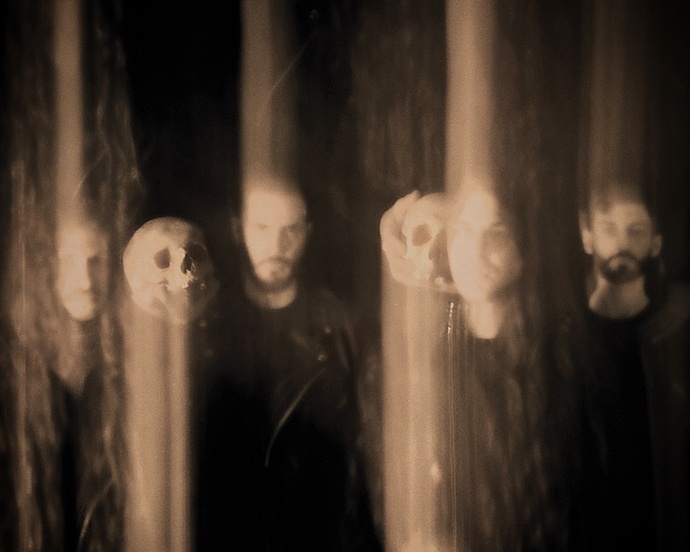 b
b
(In this new interview Comrade Aleks engaged in a fascinating discussion with Nicolò Brambilla from the genre-bending Italian metal band Aphotic, whose debut album Abyssgazer was released last spring by Sentient Ruin.)
The chronicles of death-doom know two bands named Aphotic, and both are great in their own way. Aphotic from the US was a short-lived band formed by ex-members of Dusk; sadly, it was split in 2005, leaving just three EPs behind.
Aphotic from Milan was founded in 2020 by ex-members of the death metal act Ekpyrosis: L. Zeit (bass, vocals), F. Abisme (drums), and N. Gazer (vocals, guitars, synth). Their colleague from Fuoco Fatuo, K. Coil (guitars), joined Aphotic in 2022 right in time to take part in the recording of the band’s first album as a guest. Abyssgazer was released through Sentient Ruin Laboratories and Nuclear Winter Records in March 2023.
The band tends towards rather “doomed” death metal with a few influences outside these genres, and Abyssgazer is remarkable with its rich textures, highly intense delivery, and in-depth atmosphere, which fits its concept well. The philosophy of Cosmology is hidden between its lines and manifests itself through the play of celestial lights and ugly shades born from phenomena beyond human understanding.
Nicolò Brambilla aka N. Gazer revealed a lot of interesting facts about Abyssgazer in the current interview.
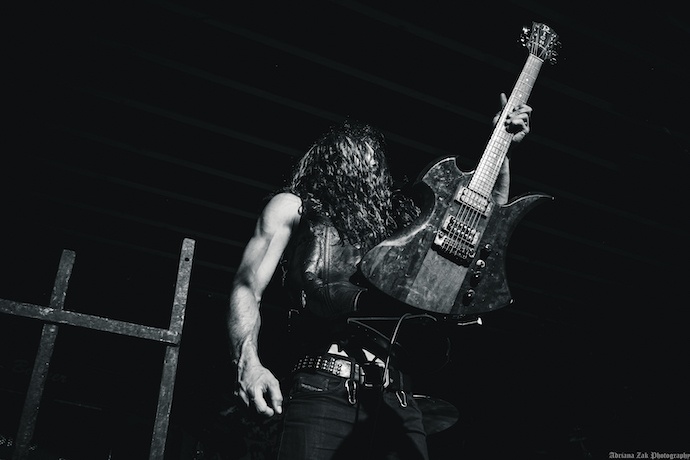
Hi Nicolò! How are you? What’s going on in your lair?
Hello, and thank you for this interview.
While our first record and debut full-length Abyssgazer was released earlier last Spring via Sentient Ruin Laboratories (USA) and Nuclear Winter Records (Europe), we recently had our first live show ever, debuting at Kill-Town Death Fest in Copenhagen earlier in September, which felt great after all the time spent working on the album in the last few years.
Our set received an extremely warm welcome and this is boosting me on working on new material, which has been taking shape over the last year and is now being revisited and expanded in the light of what that live experience and working with a new drummer taught us – in particular, what we enjoy the most in the Aphotic essence.
Our upcoming live plans (the announced ones, at least) include our first European tour with UK’s Abyssal, a band that we extremely look up to and that is also doing its first extended run of dates over the continent after some very selected US and European/UK festivals. Killtown Bookings is currently taking care of the booking and logistical planning, and this is going to happen in early February 2024.
Do I get it right that Aphotic was born during the period when Ekpyrosis was burning out? Three of you played in this band, so it looks logical. What didn’t work with Ekpyrosis?
I consider Aphotic a separate and very distinct project, with little or no continuity aside from having me as the common main composer, reason for which I understand it’s possible to find an underlying evolutionary track.
But first, I found myself ascertaining a deep personal change, might it have involved my way of thinking, perceiving music, or my preferences and aspirations, and I needed to honor this renewal by taking up a fresh groundwork and follow a new design, while my artistic experience was already being enriched by the establishment of other valuable collaborations (Blasphemer and Fuoco Fatuo, in primis), which were also getting consistent recognition and seeing their schedule getting busier.
Therefore, Aphotic exists as a space of personal experimenting with what I like in extreme music and fulfills a need of exploration that has a more individual character, before being channeled in the force of a living, recording, and (now) performing band. Ekpyrosis, while also being a much more juvenile and friendship-bound outfit, worked really the other way around, and I eventually found its significance exhausted. Although the involvement of its two latest joining members into the newborn Aphotic is to be read as prosecution of a recently spawned collaboration, and not really a band changing its moniker and starting over from scratch.
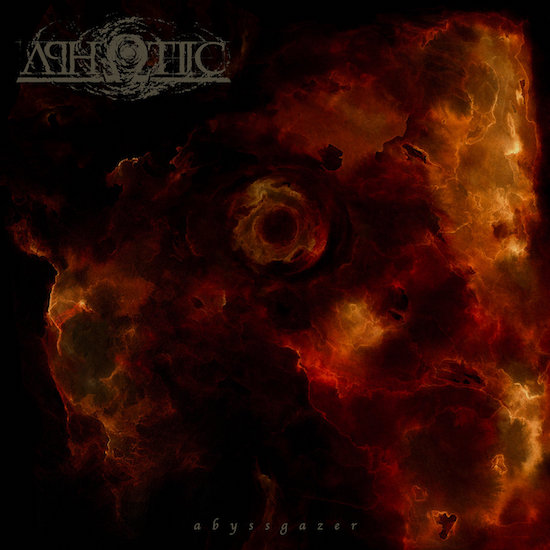
Aphotic’s debut album Abyssgazer presents a combination of atmospheric death-doom with its twisted and agonizing, more death-focused, element. How much of Ekpyrosis is left in Aphotic?
If I had to describe Abyssgazer stylistically, I would say its traditional, song-focused structures, along with the backbone of guitar riffing style, is the element that more gravitates towards what is classically defined as ‘the death metal genre’, and possibly the main element of continuity with my precedent project.
I partially disagree with the ‘doom/death metal’ label, as the album shares little qualities with that subgenre, whereas I don’t believe the general pace of songs would suffice in justifying the paragon. If still looking at the extreme metal panorama, Abyssgazer was the product of a much heavier black metal inspiration, especially the riffing (with prominent usage of arpeggios, and tremolo lead-arrangements, or the general avoidance of power-chords, to which 3rd minor intervals and 7th have been much more preferred for the main guitar lines).
But looking to the broader picture, over the album I tried to push the boundaries of the genres, integrating different post-metal, industrial, and experimental/avantgarde elements that, along with the production choices, probably encouraged the ‘atmospheric’ label, which is kind of stretched for an album that is still so much song-driven and riff-dominated.
Neurosis, Godflesh, and Swans played a huge role in the choice of some of the most martial-like tempos, in the heavily layered usage of synthesizers, in the most subtle, ostinato-like guitar arrangements, in the almost psychedelic amount of modulation effects, and in the album’s mood in general.
Although, this material was composed over a quite extended period, therefore showcasing ideas and influences that have been built over the years and possibly retaining much of the most primogenital, traditional extreme metal approach (may it be death, black or doom) that is hardwired in structures and main riffs, while the overall sensation is expanded by a more experimental arrangement and layering – at first approach, merely juxtaposed, and later completely infused into the composition.
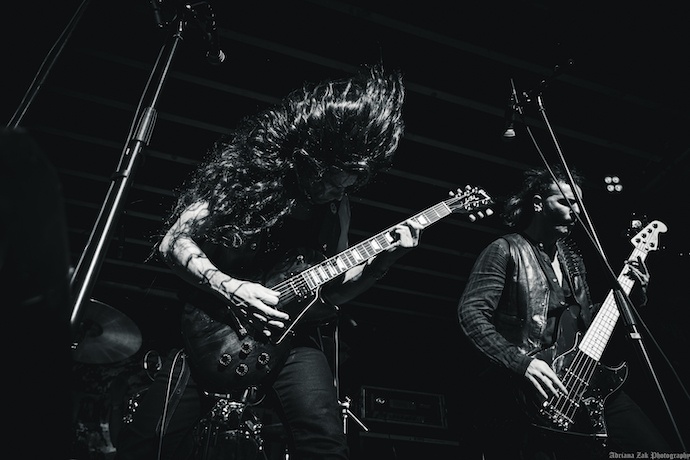
Metal-Archives intrigues with the resume of Aphotic’s lyrical themes: “Cosmology, Astrophysics, Quantum Mechanics”. How close is this description to the truth?
Abyssgazer is a cosmology-themed and chronologically structured concept album, whose narrative deals with the evolution of an ever-expanding universe, as modern cosmology depicts ours. According to current astrophysical predictions, on timescales almost impossible to imagine, an inexorably inflating universe (filled only with exhausted and degenerate stellar remnants) will reap apart the fabric of spacetime itself until matter will start decaying, and even every black hole singularity will be evaporated, due to quantum effects, into radiation emanating in nothingness. And so, as maximum entropy will be reached, time will become meaningless.
While under an astrophysical, clinically scientifical lens, this topic is nothing but an instance of one of the most ancient ways humanity has developed to explain its own finiteness and the inevitability of death: the eschatological tale, in other words – the history of eons to come, the end of everything that exists, and the ultimate irrelevance of time.
This topic is very dear to me, since I got a master’s degree in Astrophysics and my affection to astronomy roots back to my earliest childhood memories.
Did you keep in mind this concept when you started the album’s recording? Which aspects of the band’s sound help you to emphasize these themes in your music?
Indeed, my choice of bringing these topics into my music dates back before the composition of the earliest Aphotic material, as well as the Abyssgazer concept itself: the latter forced me to think in terms of a sequence of episodes and how they would have weighed on the entire album result, which is already a delicate balance of tensions and releases when creating a tracklist, let alone the fact that songs had to fit a chronological order. So, the songwriting process and the lyrical development had to go on hand in hand.
The very dark, enveloping, wide, and deep sound copes well with the lyrical themes and the overall image and esthetics. I can’t tell which one came first, if it was the will to create pitch black music or the necessity of writing about a theme that’s so inherently mysterious and fascinating, and to which I’m deeply bound since a young age – for sure they are entangled, and I can’t deny that the latter really pushed me towards making a more evocative and atmospherically dense sound.
Coil joined the band in 2022, but he took part in the Abyssgazer record episodically, as a guest. How did it happen that his position changed in the band?
Giovanni (who previously invited me to join Fuoco Fatuo, in which we also currently play together) spontaneously had an interest growing for this project while I was constantly submitting him material for either an opinion or a feedback, and while guitar tracking was already over when we started talking about his stable involvement in the band, he completed the line-up as second guitarist and actively contributed to the mixing and mastering phase, plus he recorded some drones and noises that appear through the album, and was a vital contributor to the process of aesthetical and editorial packaging of the album. Through all the years, his intuitive, visceral approach to extreme music and art had a huge influence on me.
Italy is more known for its “Italian Dark Sound” and prog scene. Did these influences somehow touch you and find their reflection in Aphotic?
Although I’m quite fond of the Italian ’70s prog scene (which I believe had some of the best musicianship ever in rock music history) and I’m counting several so called ‘Italian dark sound’ heavy/doom gems in my personal collection (which I do rarely revisit lately though, honestly), I really can’t say these played any role in influencing Aphotic. Not directly, at least.
Additional synths for Abyssgazer were recorded by two prolific musicians, Stefano Allegretti and Jacopo Gianmaria Pepe. How long did you know each other? What drove you to this collaboration?
Jacopo and Stefano are two good friends of mine and I’m very fond of their music, especially in their main incarnation Bedsore and in the role they’re playing in shaping the final form of the newest Night Gaunt material, and we’ve often been exchanging opinions over previews of our work in progress.
This also happened during the arrangement phase of Abyssgazer, when the song structure was closer to completion and I was experimenting on the layering and the ambiences, trying to push forward the more atmospheric and post metal-oriented character of the album.
I had them reviewing the synth lines I wrote, and they eventually offered themselves to track them on their equipment, producing some pads, some drones, and some leads on their analog synths. They really managed to let the arrangements shine through and gave some more identity to the tracks with the tasteful textural and leading voices they chose.
This motivated me in buying myself one of the analog synths they were using, studying this new instrument, and recording myself some more layers (especially bass). At this point, and thankfully to their impact on me, this instrument is basically vital in my composition approach.
I wasn’t surprised when I found that the album was mixed by Greg Chandler of Esoteric, who masterfully deals with any extreme (and not extreme) metal genre in his studio. How did you work with him? What was his reaction to your material?
The idea of working with Chandler (of Esoteric’s fame) even anticipates the conclusion of the arrangement phase. The main drive of this decision lies in his ability in dealing with extremely dense mixes, his taste for heavy reverbs and modulations that transcend the extreme metal tradition, and his propensity in creating a dark, enveloping, and low-end heavy sound – the latter being an uncompromisable necessity for the Aphotic project, along with the request of a dynamic, natural approach to mixing.
His analog equipment really preserved the original character of each instrument, without exaggerating any of the brightest elements and producing a very cohesive soundscape filled with details and subtleties. We reckon this choice might have been somehow unconventional for an album that, despite its obvious experimental and atmospheric intents, still holds a recognizable death metal backbone, but that indeed gave the album the personality and evocativeness we were chasing.
Greg is not only an excellent professional, but an artist we look up to, and somebody who’s very respectful towards others’ artistic intentions. I found our communication to be extremely detailed and proficient, and his effort unparalleled in making the best out of our ideas. He also spent some very rewarding, personal words about his enthusiasm on the album and I could tell he let some of his emotional responsiveness shine through, along with his taste of course.
Fuoco Fatuo was on tour in the end of August. How was it? Do you see a chance or necessity to tour with Aphotic as well?
Fuoco Fatuo’s tour in support of Bell Witch was an incredibly successful run of 16 dates in some of the best venues we’ve ever hit in Europe, including the unbelievable appearance at Motocultor Festival and the grand finale at Kill-Town Death Fest, where also Aphotic played its live debut. Dylan and Jesse from Bell Witch are two amazing people to tour and spend time with, not to mention how inspiring it was witnessing their live set closely and multiple times.
As mentioned in my first answer, we’re really looking forward to Aphotic’s first tour in February alongside Abyssal from UK; it will be great to work again with Killtown Bookings and to bring Aphotic on the road for a few gigs. I believe tours are still a valuable way to promote your music, despite the odds, such as the rising costs and the enormous variety of choice that might bring the underground live network to overcrowding sometimes. But without getting intp more strategical matters, we ourselves enjoy doing that and we’re motivated towards this effort.
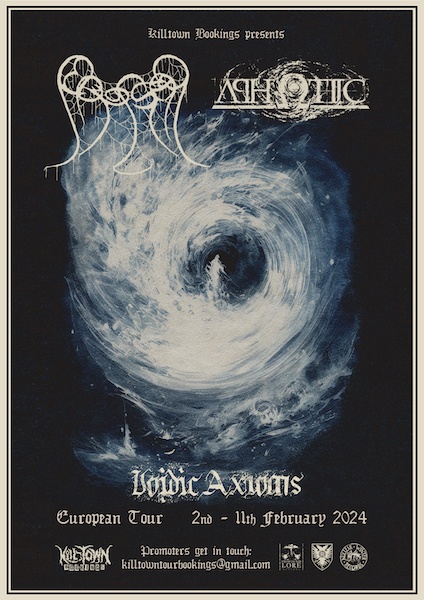
It’s hard to imagine what may motivate doom bands nowadays besides composing and playing for only doom’s sake. What motivates you to write this music? Do you feel yourself comfortable in the catacombs of the doom-underground?
As I said, I see Aphotic hardly falling in the doom metal cauldron, aside from some elements that are coming from the funeral doom panorama or the more widely defined atmospheric sludge/doom and post metal. I’m mostly about pursuing something personal, and I rarely compare it to what’s fashionable or successful in underground music, knowing well that trends aren’t really built to last.
I would say that in my case creating gloomy, eerie music is an extension of an inherently dark introspective personality, but on the other hand I admit more frankly this is the kind of music that is been with me since my formative years and it’s by necessity the obvious founding rock and vocabulary that I’m using when writing music.
That’s all for today, Nicolò. Did we miss something important? What are your plans for the rest of 2023?
I think that’s everything and thank you again for the in-depth talk. I really see us working on songwriting in these last months of 2023, before getting ready for the upcoming tour.
https://www.facebook.com/aphoticomega
https://sentientruin.bandcamp.com/album/abyssgazer
https://aphoticomega.bandcamp.com/album/abyssgazer
